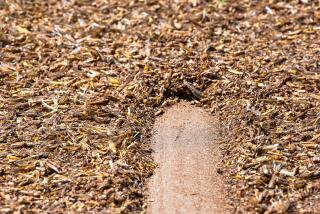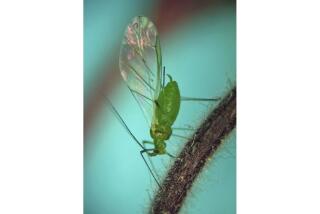Aphids: Pests to You, Dinner to Some Larvae
- Share via
Question: I have aphids all over my roses. How can I control them, and are there any beneficial insects that I could release that would help?
Answer: Several kinds of aphids attack roses. Adult aphids are usually one-eighth inch or less in length and come in a variety of colors, from green to red. Most landscape plants tolerate extensive feeding by aphids, but large aphid populations can damage buds, slow plant growth or cause leaves to yellow, curl or drop early.
The most bothersome side effect of aphid feeding is the honeydew they produce, which fosters the growth of black, sooty mold. This mold reduces light penetration of the foliage and slows plant growth.
Here are some of the keys to consider:
* Monitor your plants at least two times a week when rapid growth begins in spring. Aphids tend to cause the greatest damage when the temperatures are between 65 and 80 degrees.
* Control ants, which protect aphids from natural enemies such as ladybird beetles and green lacewings so that the ants can feed on the honeydew that aphids excrete. For ant control, consider applying a band of sticky material (such as Tanglefoot) on fabric tree wrap or duct tape applied to the base of the shrub.
When pruning, remove ant routes where branches touch the ground, other shrubs or objects. In California, treat ants in the late winter or early spring, when ant populations are low. Three methods of control to consider are cultivation, barriers and insecticide baits.
* Don’t overfertilize. High-nitrogen fertilizer favors aphid reproduction. Never apply more than necessary and use slow-release foods.
* Improve air circulation when pruning plants by opening up their canopies.
* Use a strong stream of water to knock aphids off the plants early in the day. Be sure to direct the spray to the underside of leaves, where aphids tend to feed.
* Preserve natural enemies of aphids by not applying broad-spectrum pesticides, if possible. A variety of natural enemies help to control aphids, such as parasitic wasps that lay their eggs inside the aphids.
Three well-known predators also feed on aphids; they are ladybird beetle adults and larvae, lacewing larvae and syrphid fly larvae (hover flies). To increase the food supply for these good guys, plant nectar-producing flowers such as lavender, sweet alyssum, veronica, yarrow, feverfew and scented geraniums and herbs such as dill, fennel, thyme and parsley.
You can also release beneficial insects in your garden, which will help in the short term (although your long-term goal should be to preserve the ones you have and attract more).
Ladybird beetles tend to fly away. Wetting the plants first and releasing them on the ground near the trunk and under plants in the late evening when it is cooler will reduce their desire to fly away.
Green lacewings (Chrysoperla carnea and Chrysoperla rufilabris) can be purchased as eggs or as tiny alligator-like larvae. If you order the eggs, keep them at room temperature until the larvae begin to hatch, then sprinkle or blow them into the foliage, or fasten the card or a cup containing the larvae close to the infestation. Distribute them as widely as possible. Foliage should be dry when the lacewings are released. (Ants should be under control before releasing them.)
* If you can tolerate low levels of aphid populations, you will allow the buildup of natural enemies.
For further information on aphids, check out the University of California Pest Notes Web Site at https://www.ipm.ucdavis.edu/ (pest note No. 5).
Have a problem in your yard? University of California Cooperative Extension (UCCE) Master Gardeners are here to help. These trained and certified horticultural volunteers are dedicated to extending research-based, scientifically accurate information to the public about home horticulture and pest management. They are involved with a variety of outreach programs, including the UCCE Master Garden hotline, which provides answers to specific questions. You can reach the hotline at (714) 708-1646 or send e-mail to ucmastergardeners@yahoo.com. Calls and e-mail are picked up daily and are generally returned within two to three days.






